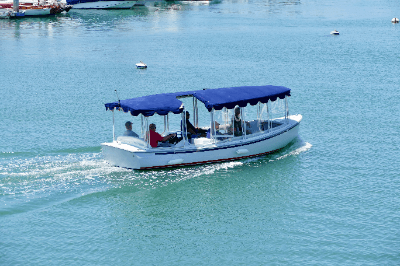What Is an Electric Boat?

An electric boat refers to a type of boat (small watercraft) that operates not with an engine but with an electric motor.
Electric boats are quieter than boats powered by burning fossil fuels like diesel or heavy oil in engines. They have lower greenhouse gas emissions and can be operated at a lower cost.
In addition, compared to engines, motors have fewer components, making them less prone to breakdowns, and they experience less wear and degradation, resulting in longer life.
The motor of an electric boat is powered by batteries, and currently, enhancing battery efficiency is a challenge for manufacturers.
For boats with relatively short sailing distances, such as pleasure boats, even with the current battery efficiency, electric boats are prevalent as they can cover the required distances.
Uses of Electric Boat
Completely electric boats that do not use engines are popular for pleasure boats and sightseeing boats with short sailing distances. However, for long-distance voyages or larger vessels, fully electric boats are not widely adopted due to battery efficiency issues.
Currently, realized electric propulsion boats include diesel-electric propulsion boats and hybrid boats.
Diesel-electric propulsion boats generate electricity with a diesel generator that powers the motor, which, in turn, drives the boat’s propeller.
Hybrid propulsion boats have a battery onboard to assist the diesel generator. The battery can be activated when additional power is needed or charged with excess electricity from the diesel generator. This allows for sailing using only electricity when desired.